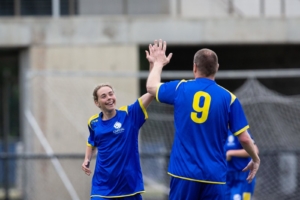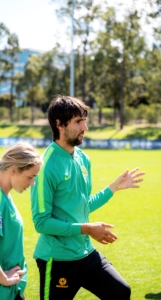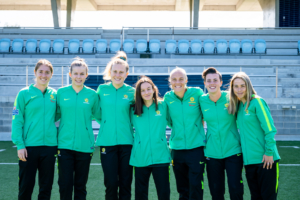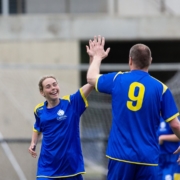Matilda was 26 years old when she played her first game of football.
Now 28, she’s moved across the country from Western Australia (WA) to Canberra in Australia to follow her dreams of being part of the first female football team to represent Australia at the 2021 IFCPF World Cup.
 Matilda, who works in IT for the National Disability Insurance Agency, is part of the Canberra United All Ability Academy, training twice a week with her developing team and has been training with Canberra United’s Under 15s team.
Matilda, who works in IT for the National Disability Insurance Agency, is part of the Canberra United All Ability Academy, training twice a week with her developing team and has been training with Canberra United’s Under 15s team.
She was introduced to football when she was invited to a Western Australian cerebral palsy and acquired brain injury (ABI) promotion weekend in WA.
When she represented the ACT at the 2019 Australian CP National Championships – the first time female players were able to represent their states – she was coached by a woman named Kelly Striton. Matilda’s team was the first team to be led a female coach, something she is very proud and privileged to be a part of.
“Kelly has become a mentor to me, showing and driving me to do the best I can,” said Matilda.
Matilda says she’s had a number of mentors and role models who were instrumental in getting her to where she is today.
“My mentors have helped to connect me with others across the world. I think each mentor is able to provide something new to me. They know more than I do about what I’m able to achieve,” Matilda offered.
 Matilda knows the value of mentoring, and has been mentoring for many years now.
Matilda knows the value of mentoring, and has been mentoring for many years now.
“Before I was moving to Canberra, I was coaching younger kids affected by cerebral palsy and ABI. Most recently I became part of a football community within my local club Tuggeranong Football.
“Though it was a short season, I coached the under 10 girls’ team. All I wanted was them to have fun, training twice a week and playing on the weekend,” said Matilda.
She’s also had the opportunity to work closely with larger groups of young people.
“Through the all ability academy, I was invited to attend the all ability football league training sessions where I played and assisted with up to 30 kids using their strength and skills to play football at the best of their ability,” Matilda shared.
Matilda believes a mentor’s role is to provide all different types of support and guidance for the many different facets of your life. This could include career and future goals, or even encouragement to explore new and different hobbies.
She says a mentor is like a step above being a friend. Your job is to support the person to have a voice, and listen to what they want and need. Matilda also feels mentors can take steps to educate other people in the mentee’s life about their life, wants and needs.
 As a mentor, Matilda’s goal is to show others that people with disabilities are capable of achieving anything they put their mind to, and that when the going gets tough, she’ll be there to catch her mentees and pick them up.
As a mentor, Matilda’s goal is to show others that people with disabilities are capable of achieving anything they put their mind to, and that when the going gets tough, she’ll be there to catch her mentees and pick them up.
“Disabilities are disadvantages, but we have plenty of other advantages that are more important.
“Growing up, I didn’t have the internet or the knowledge available in today’s society, neither did the ones closest to me. I hope to use the experiences I have had and pass on what I did and how I coped with my disadvantages (aka disabilities) onto the next generation.
“Since playing football, this was exactly the program and inclusion I was hoping to become a part of. Providing the opportunity to be a part of something so special and important to them.
“I hope to build a network and community or family where everyone is seen and heard,” Matilda finished.
The All Ability League began on October 3 and runs until 21 November. The session run on Saturday mornings at Hawker Football Centre between 9:00am – 10:30am. The League is aimed at ages 5 to open, male and female.



